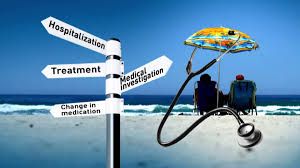
Plan to Travel Healthy- Part 3

No one wants to be sick on vacation. So, our advice is that you make a plan to be healthy when you leave and stay healthy while you are gone. We can’t avoid every bug out there, but we can do our best to have the best possible defences in place. That simply takes a little preplanning.
In Part 1 of our Plan to Travel Healthy travel tips we talked about preparing to be healthy when you leave on a trip and to stay healthy while you are away by getting enough rest, staying hydrated, and eating well. In Part 2, we provided you with some tips on where to get health travel advice regarding your specific destination and how to determine which vaccinations you may want to consider. In Part 3 we will provide you with some tips on what to do if you get sick while you are away.
What if you get sick while you are away? First, please tell someone! Tell your travelling companions, your hosts at the lodge, your group leader and if you are at a resort or lodge that has a medic or physician on staff, tell them. Even if you ‘just’ have an upset stomach or feel like you may have a bit of a fever, tell someone so that they can keep an eye on you. Next, monitor your own health and respond accordingly, whether you got a little too much sun, had a little too much of the local rum, ate something that didn’t agree with you or got a bug bite that seems a little more ‘nasty’ than is normal. Most of these afflictions can be treated with something as simple as rest and hydration, or maybe some ibuprofen or itch relief cream. However, any of these symptoms can also turn into something more serious or, in fact, may be something much more serious that just feels like, say, a run of the mill hangover.
- Your name, any allergies or medical conditions that you have and who to contact locally if you cannot communicate for yourself;
- The name, address and phone number of a family member or friend at home;
- Address and phone number of your accommodations at your destination;
- Emergency contact phone number for your travel health insurance provider;
- Your family physician’s contact number, in case of emergency the local medical team may need information regarding your medical history.
Which brings us to another important point, always ensure that you have adequate travel health insurance coverage before you leave on your trip. There are many ways you can cover yourself. Your employer’s health insurance package may include travel health coverage, you may have purchased a blanket coverage through any number of insurance underwriters, or you may purchase travel health insurance on a trip by trip basis. It is important to be sure that your coverage will cover you and your specific needs so you will want to review the coverage before you sign up. For example, if you have a pre-existing medical condition be sure that the insurance you are traveling under will cover you – many don’t unless you purchase additional or supplemental insurance. Another travel insurance ‘top up’ that is important to consider is emergency medical evacuation – in case you need to be flown home (or to the nearest major medical centre) for medical reasons. Depending on where you travel to the costs for such an emergency can quickly add up.
If you do need medical attention or have a medical emergency while you are away, contact your insurance company and they will provide you with advice and assistance. Of course, in an emergency situation proceed directly to the nearest hospital and contact your insurance company as soon as you are able or have someone contact them for you. Your countries embassy or home country government office, in your destination country, can also provide you with support and assistance.
What if you get sick after you return home? You should contact your health care provider for a medical examination once you return home if you have a chronic illness, such as cardiovascular disease or a respiratory disease, especially if you notice any changes in your condition. Also contact your health care provider immediately if you experience symptoms such as fever, persistent diarrhea, jaundice (yellowing of the skin), skin disorders, urinary/genital infection or vomiting after you return home or if you were treated for malaria while traveling.
On last thing to keep in mind, preparing for the worst can be a little overwhelming and some of the information you may read during these preparations can be a bit frightening. Doing the research and being prepared is defiantly worth it – just in case. If you run into questions or concerns that you just can’t seem to find answers for, or if you just aren’t sure about something please let us know and we will do our best to answer your questions or put you in touch with someone who can.



